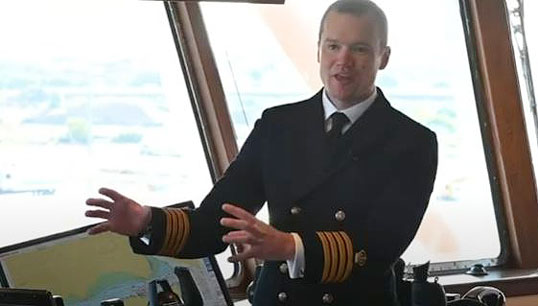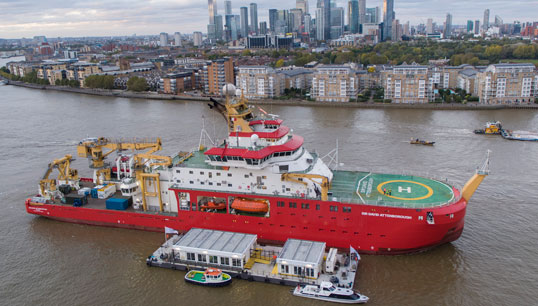- Topics
- Campaigning
- Careers
- Colleges
- Community
- Education and training
- Environment
- Equality
- Federation
- General secretary message
- Government
- Health and safety
- History
- Industrial
- International
- Law
- Members at work
- Nautilus news
- Nautilus partnerships
- Netherlands
- Open days
- Opinion
- Organising
- Podcasts from Nautilus
- Sponsored content
- Switzerland
- Technology
- Ukraine
- United Kingdom
- Welfare

Crew onboard the UK's new polar research ship, the RRS Sir David Attenborough, have shared insights into what it takes to navigate a vessel expected to continue the UK's long tradition of polar exploration and science, including important climate change research projects. Deborah McPherson reports
The crew answered questions from Nautilus during the vessel's special visit to London Greenwich between 28-30 October 2021, ahead of global climate conference COP26. The visit was also part of a three-day Ice Worlds Festival hosted by the Royal Greenwich Museums in partnership with British Antarctic Survey (BAS) – with live talks by scientists and experts living and working in polar regions. Virtual-only tours of the vessel were also available at the museum.
The state-of-the-art ship, operated by BAS where Nautilus has members, is expected to enable world-leading research in Antarctica and the Arctic for the next 25-30 years. It will leave the UK for its maiden voyage in mid-November.
Two alternate crews will sail the vessel, including one headed by Captain Will Whatley and another by Captain Ralph Stevens.
Asked how different a polar research vessel is to operate compared to other Merchant Navy vessels, the crew said the main difference is the additional systems provided for conducting science.
'The Sir David Attenborough vessel has dedicated deck machinery for deploying scientific equipment as well as an array of echo sounders and swath systems allowing the ship to function as a mobile laboratory. This is in addition to its logistics role in supplying the British bases in Antarctica. These various aspects of the vessel's operations mean the crew have to be dynamic in changing from conducting science to cargo operations.'
This vessel is also the first to be built in the UK to Polar Code regulations which came into force in 2017.

'Because of the nature of our operations, all our systems on outside decks are required to operate at a minimum -35 degrees Celsius,' said the crew. 'We also have survival equipment on board in case we need to abandon ship onto the ice. Each crew member has a personal survival kit and there are group survival kits which contain items such as additional food rations and tents.'
As the vessel is very complex, the crew also conduct on board training regularly covering emergency scenarios and familiarisation with the vessel's systems, including fuel consumption, rough weather rolling and emergency steering, dynamic positioning and man overboard protocols.
The Polar Code has brought in additional training requirements for deck officers when the vessel is operating in polar waters where ice is present. Advanced training for master and chief mate, and basic training for officers in charge of a navigational watch, is also required. The training covers principles of ice navigation as well as other topics such as pollution prevention, said the crew.
All the crew are also required to be familiar with the Polar Water Operations Manual. This details the procedures for when the vessel is operating in polar waters as well as the vessel's lifesaving appliances.
Covid-19 presented a wide range of challenges to the delivery of the vessel, said the crew. Travel restrictions prevented specialists visiting the ship to fit and test equipment, and access to the ship was restricted to essential personnel only. Once restrictions began to lift, BAS was able to begin to open access to the ship, and the commissioning and snagging processes gathered pace ahead of the ship's first expected deployment to Antarctica. The vessel has not yet had any cadets working on board due to Covid-19.
During its first deployment the RRS Sir David Attenborough will be delivering cargo in early 2022 to the English Coast of the British Antarctic Territory, providing critical support for the International Thwaites Glacier Project – a collaboration between the UK and US, to learn more about the so-called 'Doomsday Glacier'.
The polar vessel will also deploy Argo floats in the Southern Ocean to gather data on ocean temperature. The International Argo program supplies most direct measurements of ocean temperature for the study of global warming and climate change. Within this project, the Southern Ocean has always been sampled less than other more accessible oceans. Deploying these Argo floats will address this shortfall, improving measurement and understanding of global change.
Crew also shed light on the sort of extensive planning necessary for the mental and physical health of the 30 crew, plus the 60 scientific and other support staff in readiness for polar conditions. Crew can be onboard for three months or more.
Each member of crew and other personnel receive a personalised kit bag containing Personal Protective Equipment (PPE), and clothing for cold weather. The vessel also has a large stock of PPE on board for the including insulated boiler suits and warm gloves.
Social events to entertain the crew and scientists and keep morale up are also organised, and there is a well-equipped gym onboard, as well as a sauna.
When possible, every effort is made for the crew to go ashore and explore the bases and surrounding areas. 'This is particularly important as the vessel can sometimes be at sea for four weeks at a time conducting science or transiting north and south from the UK. '
Mealtimes are an important time for crew and other staff to socialise and unwind from work, so a variety of meals are served catering to specific dietary requirements. Stores are carefully planned to ensure that meals contain as much fresh fruit and vegetables as possible during the journey.
All personnel also have access to the internet as well as being able to dial out from their cabin phones so they can contact home.
Tags
